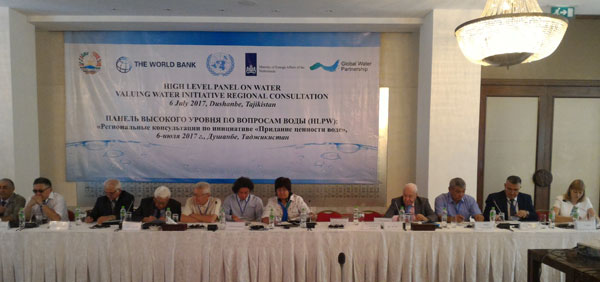REGIONAL CONSULTATION ON THE VALUING WATER INITIATIVE OF THE HIGH LEVEL PANEL ON WATER
6 July 2017, Dushanbe
The regional consultation was co-organized by the Tajik Ministry of Energy and Water Resources, the World Bank and the Government of Netherlands and brought together experts from Kazakhstan, Tajikistan, Uzbekistan, Turkmenistan, Armenia, Azerbaijan, Georgia, and Mongolia.
The First Deputy Minister of Energy and Water Resources of Tajikistan Mr. Sulton Rakhimzoda made a key report on the International Decade for Action “Water for Sustainable Development”. Then, Mrs. Marion van Sheiken, Ministry of Foreign Affairs of the Netherlands presented her key report on “Valuing water”.

Actually, in my opinion, the title of the initiative is a little strange: how one can value water if its value is immense. Everywhere we feel the beneficial effect of water for human life, flora and fauna. Moreover, water is a part of production process as the technological and material factor. At the same time, we also bear in mind a possibility of water extremes, such as storms or droughts, floods or low-water, water scarcity or abundance. However, the most important is that the world exists until water is available! At all times people identified water with nature and as a sacred thing. Human prayed to the Supreme God that water be sent down to them and asked, at the same time, to protect them from destructive and unpredictable nature of water.
It is not right and logical to speak about any concrete value of water since the latter is determined by its different uses in time and space. The higher the value of water, the stronger is scarcity and the higher the cost of its substitution (if it is possible on the whole!!!). However, the dimensions of water related to the world of spirit, recognition of water as a part of the nature in aesthetic terms virtually is invaluable. Moreover, in terms of water management, water is a means that unites stakeholders in order to achieve a certain use and distribution order or system. At the same time, if any negative situation or conflict occurs, water can be the apple of discord!
Thus, the value of water cannot be treated purely as an economic category as it rather refers to moral, spiritual and, to a certain degree, ideological aspects fueled by education. And exactly this, non-economic or, I would say, ideological value of water is determined by a body of political, educational, and economic actions, but, to a certain degree, is a category related to spirit that characterizes attitude to water in society. Although all religions, especially, Islam, recognize the holy nature of water, one should note that exactly the public attitudes (rather than religion) determine the real value of water in one or another country. Moreover, the degree of country development, undoubtedly, has a certain impact on it, but, for example, the attitude to water in the United States is far from worshiping of water as in Japan.
Therefore, one of first priority tasks of valuing water in the society is raising recognition of the role and importance of water at all levels of education, starting from preschool education, with the help of religious, non-governmental services, science and culture, and mass media.
Another important dimension of water value is economic one. The well-known British hydrologist Peter Rogers believes that value of water should come from intensity of water use in various sectors, while maintaining sustainable supply and water quality. Moreover, water cost in each sector should be close or equal to the user value of water in this sector.
Generally, water pricing must depend on each specific sector and, at the same time, consider social, technical, economic, and environmental factors. It is also important to keep in mind the users’ capabilities to pay. And the water pricing should be targeted at water saving. As to sustainable development and the role of water in this context, the economic value and the cost of water should approach each other; this way, we can ensure sustainability of development financing and water saving. Currently, budget funds are available for water entities, provinces, and regions. However, if every Basin Irrigation System Administration, Irrigation System Administration, provincial or regional water-management organization are provided with budget funds as a payment for water delivery, then it would be possible to set bonuses for water-management organizations for water saving, if, at the same time, the users’ water requirements are met. This would encourage revision of water rates and water delivery by the organizations.
In my speech, I touched upon two key matters regarding valuing water:
- a need for comprehensive development of water measurement and accounting system;
- treatment of water productivity as one of very important indicators of water value.
A task of regional consultations of the High level panel on water is to elaborate a pricing mechanism with the final aim of achieving sustainable functioning of the water sector, its development and support.
Conclusions to be made from the regional consultation:
- extend work in the riparian countries (first of all in Uzbekistan) for deepening understanding of the ideological value of water;
- develop proposals for implementation of the financial-economic mechanism in the water sector at both state level and water user and WUA level, using charges for water and water management services and cross-cutting subsidies. This mechanism should be inclusive of growing water consumption and water value and cost in the future;
- the mechanism should be based on the provision that implementation of such mechanisms requires high competent experts and, consequently, calls for enhancement of the value (remuneration) of those who is responsible for water management.
Prof. V.A.Dukhovniy,
Director SIC ICWC
|